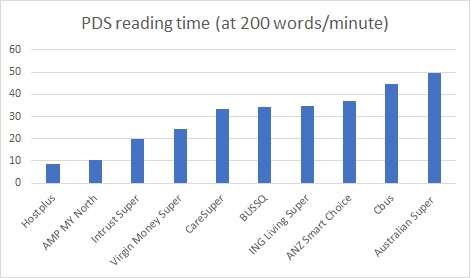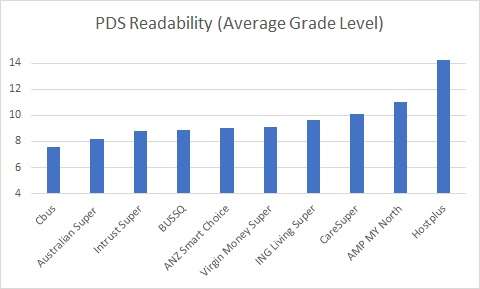The superannuation industry is in the news again today; described as an “unlucky lottery”.
Among other issues, poor information is still a problem – ” They’re bamboozled by poor disclosure …”
I thought I’d have a look at how easy it is to read some Product Disclosure Documents. I’ve looked at two dimensions across 10 popular funds.
1. Likely reading time
People are less likely to read longer documents. We all prefer to read short documents than long ones – we want information fast.
2. Readability
People need easy to read text to help them understand complex ideas. Readability indices are one way to measure how easy it is to read and understand text.
All these indices are higher than the Australian Government’s recommendation of between 3 & 4. link. My view is aiming at about 7 – 8 is OK for this type of content.
Why readability matters
The PDS is a functional document. People are supposed to use these to decide whether the fund is a right fit for them. Of course they need to read and understand the information in the PDS to be able to make this decision. And this is an important decision that can have impacts over a lifetime.
Many application forms ask potential members to declare that they have read and understood the PDS. A lengthy or difficult to read document discourages reading. It may encourage people to make a false declaration – to tick the box without reading or understanding.
And difficult to read documents are risky for funds too. The focus is shifting from ‘did you read the document’ (aimed at the reader) to ‘is the document readable’ (aimed at the writer).
Be careful with readability tools.
The readability tests I’ve used are mechanical tests that look at word and sentence complexity. They cannot be relied on by themselves, but a high grade index does indicate the text could be simpler.(The grade number refers to US school grade)
These tools do not consider document structure, meaning and the usefulness of content. It is possible to write highly readable rubbish.
The tests in detail
1. Reading time
I divided the total word count by 200. The avaerage reader reads at about 200 – 220 words per minute.
2. Readability
I used computerised versions of
- Flesch Kincaid Grade Level
- Gunning Fog Score
- Coleman Liau Index
- SMOG Index
- Automated Readability
- Index Spache Readability Score
- Dale-Chall Readability Score
and calculated the aritmetic mean.
Documents were sourced on 29 May 2018 from:
| Hostplus | https://hostplus.com.au/financial-services-guide |
| Australian Super | https://www.australiansuper.com/tools-and-advice/learn/product-disclosure-statements |
| Intrust Super | http://www.intrustsuper.com.au/wp-content/uploads/Core-PDS.pdf |
| CareSuper | https://www.caresuper.com.au/super/forms-publications/pds |
| Cbus | https://www.cbussuper.com.au/content/dam/cbus/files/forms-publications/general-information/Cbus-Industry-Super-PDS.pdf |
| BUSSQ | https://www.bussq.com.au/disclosure |
| ANZ Smart Choice | https://www.wealth.anz.com/content/dam/anzwealth/pdfs/superannuation/Smart-Choice-Super-Pension-PDS.pdf |
| Virgin Money Super | https://virginmoney.com.au/content/dam/virginmoney/vma-downloads/superannuation/Virgin-Money-Super-Product-Disclosure-Statement.pdf |
| AMP MY North | https://www.amp.com.au/content/dam/product/mynorth/MyNorth_SuperPension_PDS.pdf |
| ING Living Super | https://www.ing.com.au/pdf/ING_DIRECT_Living_Super_PDS.pdf |

